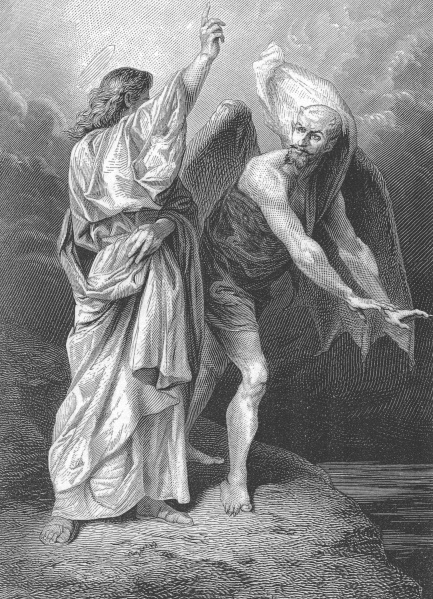Why do progressives reject Bernie Sanders?
“It is better to rule in hell than to serve in heaven.” Lucifer, in Paradise Lost
John Milton got it right: The culture of heaven is to serve. The culture of hell is to rule.
Those who seek power would rather rule in hell then serve in heaven. Power is more important than the institutions they are supposed to be stewarding. This is a simple way to describe the Iron Law of Institutions.
The Democratic National Committee, steward of the National Democratic Party, is doing everything in their power to block the nomination from avowed Socialist Bernie Sanders. In 2016, the DNC used superdelegates to swing the nomination from Sanders to Hillary Clinton. Since then the convention rules have been changed to prevent the superdelegates from voting until after the democratically elected delegates have voted.
Bernie Sanders has a huge, enthusiastic grassroots movement all over they country. He has raised more money than any other candidate from millions of small donations.  Until Super Tuesday he was poised to arrive at the Democratic convention in July with the most delegates. Now that appears less likely.
Until Super Tuesday he was poised to arrive at the Democratic convention in July with the most delegates. Now that appears less likely.
This reminds me of something called the Iron Law of Institutions.
The Democratic power brokers would rather destroy the party than allow Bernie Sanders the nomination, a move that would strip the Democratic establishment of power. Jon Schwartz explains this principle.
The people who control institutions care first and foremost about their power within the institution rather than the power of the institution itself. Thus, they would rather the institution “fail” while they remain in power within the institution than for the institution to “succeed” if that requires them to lose power within the institution.
This is the highest form of arrogance and cynicism. And we are watching it play out right in front of us.
The Iron Law of Institutions
Schwartz likely got his idea from the writings of Robert Michaels, a German Sociologist. In his 1911 book, Political Parties, Michaels writes of what he calls the Iron Law of Oligarchy.
The “iron law of oligarchy” states that all forms of organization, regardless of how democratic they may be at the start, will eventually and inevitably develop oligarchic tendencies, thus making true democracy practically and theoretically impossible, especially in large groups and complex organizations.
Here’s how this works. Over time, a grassroots movement with a fresh set of idea grows large enough to require structure. The movement often morphs into an organization with visionary leaders and administrators. In democratically informed settings, these organizations eventually become bureaucratic institutions run by a “ruling class.” The ruling class loses touch with the people they are meant to serve and the ideas they are meant to steward. They become enamored with their power and will sacrifice the people and institution to retain power.
 The Iron Law of Institutions describes what we are watching in the Democratic primaries. The Bernie Sanders campaign has vision, enthusiasm, and an inspired leader. They are out to create a revolution, to take over the party and destroy the oligarchs of the Democratic ruling elites. If Bernie Sanders has the most delegates at the convention, the ruling class will do all in their power to deny him the nomination.
The Iron Law of Institutions describes what we are watching in the Democratic primaries. The Bernie Sanders campaign has vision, enthusiasm, and an inspired leader. They are out to create a revolution, to take over the party and destroy the oligarchs of the Democratic ruling elites. If Bernie Sanders has the most delegates at the convention, the ruling class will do all in their power to deny him the nomination.
Atheism gives us only the material universe. Transcendent truth, goodness and beauty are empty of meaning. Everything is reduced to opinion and power. In a world where truth is abandoned, all that is left, as Nietzsche has proclaimed, is the “will to power.”
But, thankfully, this is not reality. We live in a whole universe, one that includes transcendence, where truth, beauty and goodness flourish.
Jesus’ approach to power
At the beginning of His ministry, Christ fasted for 40 days and nights (Matthew 4:1-10). At this point of vulnerability he was taken into the wilderness to be tempted by Satan, who proffered three temptations to power. Note both the temptation and Christ’s response.
First temptation: And after fasting forty days and forty nights, he was hungry. And the tempter came and said to him, “If you are the Son of God, command these stones to become loaves of bread.” This was a temptation to use power Jesus possessed to alter nature to feed himself.
How did Jesus respond? But he answered, “It is written, Man shall not live by bread alone, but by every word that comes from the mouth of God.”
Second temptation: Then the devil took him to the holy city and set him on the pinnacle of the temple and said to him, “If you are the Son of God, throw yourself down, for it is written, ‘He will command his angels concerning you,’ and ‘On their hands they will bear you up, lest you strike your foot against a stone.’” This was a temptation to use power over the spiritual world, power Jesus possessed, for His own benefit.
How did Jesus respond? Jesus said to him, “Again it is written, ‘You shall not put the Lord your God to the test.’”
Third temptation: Again, the devil took him to a very high mountain and showed him all the kingdoms of the world and their glory. And he said to him, “All these I will give you, if you will fall down and worship me.” This was a temptation to political power, power over kingdoms.
 Jesus spoke truth to power
Jesus spoke truth to power
How did Jesus respond? Then Jesus said to him, “Be gone, Satan! For it is written, ‘You shall worship the Lord your God and him only shall you serve.’”
Note that in each case, Satan tempted Jesus with power and Jesus responded with truth—“it is written”—with the Word of God.
If one denies God, power is all that is left. If one recognizes that God exists, then objective truth also exists. And truth becomes the antidote to power.
How did Jesus respond to the disciples at the last supper when they argued over who was “best”? He served them, he washed their feet.
How did Jesus respond to the power that binds us to sin and death? He set us free by the free offering of His own life to pay our penalty.
Living in only half the universe, those who seek power would rather rule in hell then serve in heaven. Their power is more important than the institutions they are to steward. Living in the whole universe the antidote to power is truth, goodness, love and beauty. Let us learn to live in the presence of the kingdom and live in truth.
- Darrow Miller






